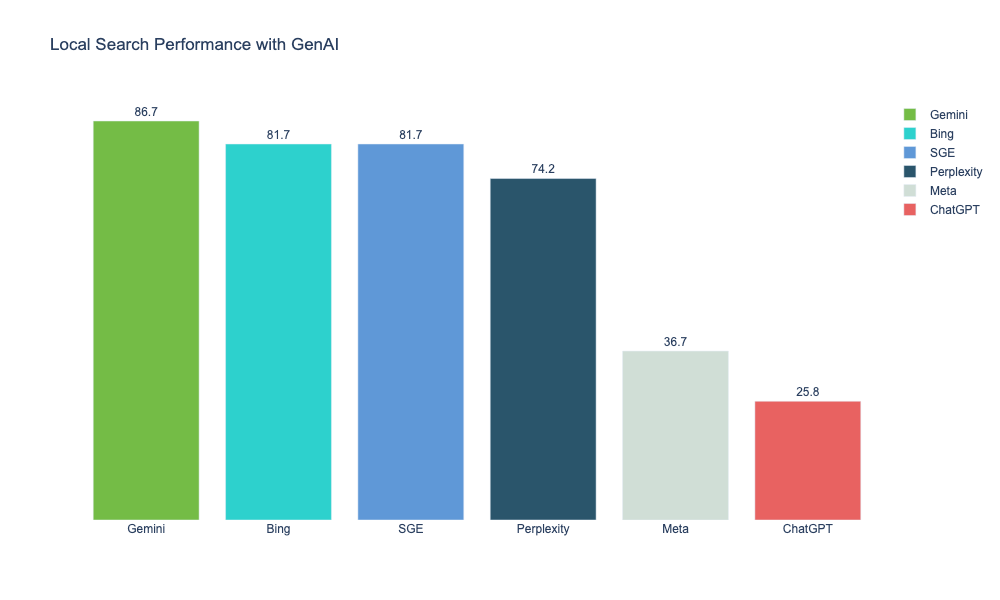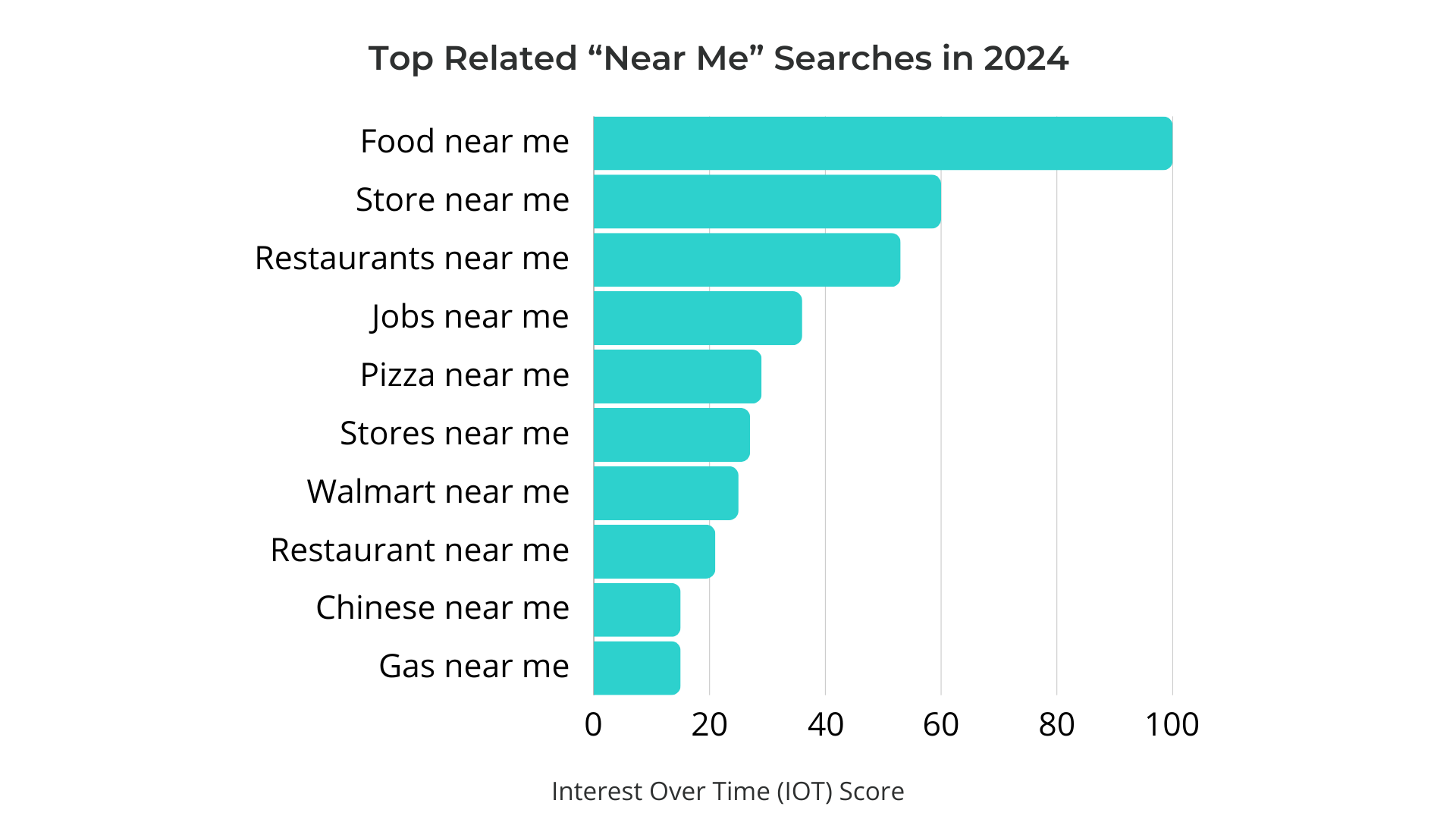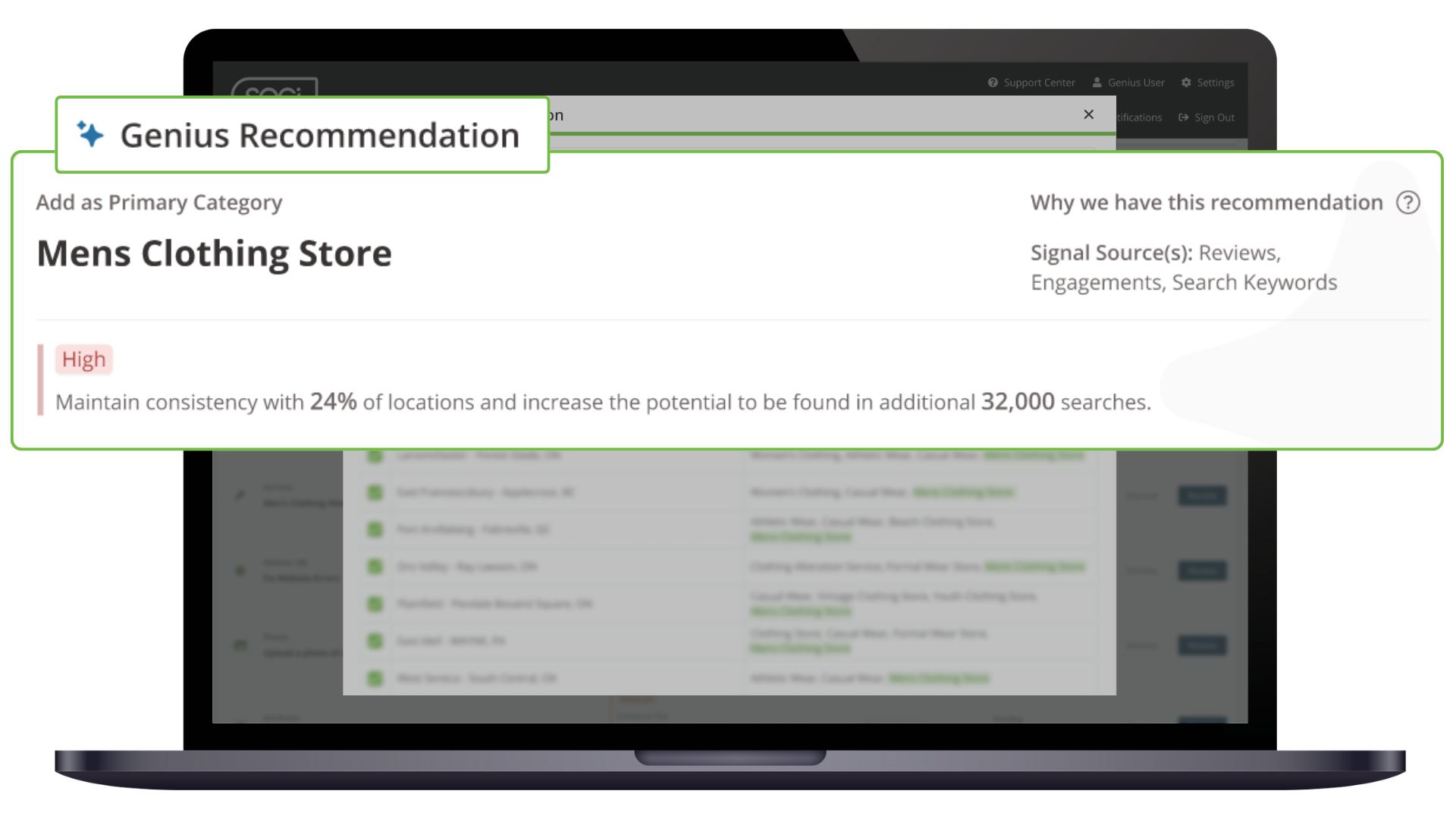Search That Performs: How NTY Used AI to Unlock Double-Digit Growth in Local Visibility
AI for Local: What Brands Must Do As Search Evolves
For the past two years, consumers worldwide have been inundated with generative AI (genAI) in the workplace and their personal lives. In search, we’ve seen important releases from Google, Bing, OpenAI, Perplexity, and others.
For instance, Google released Gemini to the public in December 2023 and then publicly rolled out AI Overviews (AIOs), powered by Gemini, in May 2024. Both AI platforms affect how billions of people search online.
In May, we conducted research to discover how genAI chatbots and search engines performed with local searches. Out of the six platforms studied, we found Google’s Gemini at the forefront in local genAI search.

To continue our research on local genAI search, we wanted to understand better how Gemini performs local searches across various industries. Do some industries perform better than others? What factors most influence Gemini’s local search results?
That’s where this study comes in! Dive in to find these answers and more.
The Methodology and Research
For this report, we chose to study Gemini because it performed best in our initial local genAI search testing and because, according to Google, Gemini is the “model customized for Google Search” and helps power AI Overviews.
Also, since Google dramatically reduced the frequency of AIOs due to some prominently inaccurate results, we couldn’t consistently produce AIOs with our local search queries.
Goals of the study
- To measure Gemini’s ability to answer local search queries across six industries effectively.
- To understand where Gemini, and thus AIOs, pull information from and what multi-location businesses can do to improve their rankings.
Local Queries and Questions Asked
Google claims both Gemini and AIOs help answer increasingly complex questions. “Rather than breaking your question into multiple searches, you can ask your most complex questions, with all the nuances and caveats you have in mind, all in one go.”
To test Google’s claim, we asked three local-centric questions with two descriptive qualifiers. Then, we asked the third question again, but with one or two additional qualifiers. We tested these types of questions across six industries.
Example questions:
- With two qualifiers: “Best restaurants for business meetings near downtown Austin.”
- With three to four qualifiers: “Best restaurants for business meetings near downtown with valet parking and gourmet food in Austin.”
For consistency, we always included “best” at the beginning and “Austin” or “in Austin” at the end and started a new chat for each query. Additionally, three of our team members are based in different areas of Austin, while two others searched outside of Austin. However, these geographical differences had minimal impact on our results.
We also asked Gemini to “please cite your sources” after each initial query to see if it could pull additional citations and links.
The six industries we examined include:
- Hotels
- Restaurants
- Retail
- Banks/financial services
- Local services
- Property management/apartments
Scoring
For each of the Gemini results, we tracked and scored them based on the following:
- Contains accurate information and results (1-3 point scale)
- Reliable resource link (0-3 point scale)
- Can cite other sources when prompted (0-3 point scale)
We also examined the average number of Gemini’s listings and whether they matched the Google 3-Pack.
- Average number of listings (0-5)
- The average number of listings that match the Google 3-pack (0-3)
One reason we did this is that if Gemini’s results are similar to or match the Google 3-Pack, then it’s apparent that Gemini’s LLM is pulling from Google Business Profiles (GBPs) and using similar ranking factors.
One of the biggest mysteries in AI search has been what determines the ranking of information. So, we wanted to see if we could shed some light on this topic for local queries.
Now, let’s jump into the results!
Main Industry Takeaways
In our analysis, we also wanted to examine the number of listings Gemini produces and if they match the Google 3-Pack. This information will help multi-location businesses better understand their ability to rank in Gemini and where Gemini pulls information from.
Number of Listings Produced
Looking at the below data, it’s clear that hotels and restaurants produced the most listings, followed by retail and property management companies.

Why do hotels and restaurants have more listings?
The search queries for both verticals were particular and contained the same number of qualifiers as other industry queries. However, Gemini might recognize that both are in competitive markets, with numerous players fitting the bill. Thus, it gave more listing options.
Additionally, the fact that hotels, restaurants, and property management companies have the most linked sources suggests a potential connection between competitive markets and Gemini’s preference for linking to authoritative sites.
These citations included TripAdvisor, Booking.com, Apartments.com, and each business’s local landing page.

Furthermore, industries with high listing numbers likely have a higher search volume and user interest. Examining the top 10 related searches for “near me” in 2024 on Google Trends reveals their respective Interest Over Time (IOT) scores and how often people search for these places.

Clearly, food and restaurant searches are at the top, along with retail stores. The popularity of these near-me searches portrays the connection between high volume searches, competitive markets, and the number of citations Gemini produces.
Note that despite averaging three citations per result, hotels don’t often appear in “near me” searches because most people aren’t searching for hotels nearby.
Conversely, fewer listings imply a more niche market and untapped local SEO opportunities for businesses in these industries. You should ensure your local pages have detailed information about what you offer. Additionally, it’s also helpful to work with local bloggers and magazines to get featured articles, boosting your brand’s visibility further.
How Often Gemini Matches the 3-Pack
If Gemini’s results often match the Google 3-pack, we can infer that Gemini likely relies on Google’s Search and Maps algorithms to produce its results.

Here, the results for hotels and retail most often match what’s in the Google 3-Pack. While keeping track of your GBP rankings is always important, you should pay extra attention to them if you’re in one of these industries. For instance, if you’re in the coveted 3-pack for specific queries, you’ll likely appear in Gemini results.
For banks/FinServ and local services, we often saw no 3-Pack results in Google Search, particularly for banks/FinServ. This means these complex local search queries might be too complicated to determine and showcase three GBPs.
For property and restaurants, only one of the results found on Gemini was in the 3-pack, or at times, none at all. In some cases the results on Google.com featured no 3-pack. These findings suggest that Gemini is pulling data primarily from sources other than Google Search and Maps for these two industries.
That said, for shorter queries with fewer qualifiers, Gemini’s listings and the 3-pack might match more frequently. Further studies will need to be conducted to confirm.
The Best and Worst Performers in GenAI Local Search
First, let’s explain how Gemini performed across industries. Remember, we scored these based on Gemini’s ability to include accurate information, link to reliable sources, and cite other sources when prompted.

Top Performers
As you can see, hotels and property management companies performed best. The hotel industry performed well because Gemini provided comprehensive information from well-established travel and review websites like TripAdvisor and Booking.com.  Similarly, property management companies performed well thanks to Gemini’s ability to generate accurate and informative descriptions.
Similarly, property management companies performed well thanks to Gemini’s ability to generate accurate and informative descriptions.
Also, by referencing authoritative sources such as Apartments.com, Apartment List, and the local property pages of property management companies, Gemini enhanced the credibility and quality of the content.
Low Performers
Our retail and local service queries performed the worst in Gemini. Our retail queries varied dramatically, from asking for the “best stores with toys for kids under 10 in Austin” to “best stores for creative female anniversary gifts under $100 in Austin.”
Gemini ranked low with these retail queries because it produced questionable results for specific queries and couldn’t cite multiple sources when prompted.
For instance, when asked to find the “best stores for anniversary gifts under $100 in Austin,” Gemini suggested the Texas Capitol’s gift shop and the Museum of Weird’s gift shop — neither ideal shopping places for any gifts, much less anniversary gifts.

Local services also scored low, mostly due to Gemini’s inability to provide resource links. We suspect this industry faced these citation issues due to the specificity of queries, lack of standardized information across the web, and few listings on authoritative local directories outside of Google.
For instance, when asking our most complex local services query, “best quick dry-cleaning with same day service for formal attire under $100 in Austin,” Gemini gave a phone number and reviews for a specific GBP location, despite multiple locations with Google profiles in Austin. Furthermore, Gemini didn’t cite any links. This result contained both confusing and misleading information.

Recommendations for All Industries
Below is a chart highlighting how often certain data points appeared across different industries. This information gives us further insight into what Gemini prioritizes when answering local search queries.

Here’s an explanation of each data category and top takeaways.
Descriptions:
Clearly, Gemini wants to produce short descriptions in its results. That’s no surprise, as one perceived benefit of genAI chatbots and Gemini is to produce short quick answers.
From our analysis, it was difficult to tell where Gemini pulled these descriptions from. When asking Gemini where it pulls information for business descriptions from, Gemini stated the following:
- Websites: Company websites, news articles, blog posts, and online directories
- Social media: Platforms like LinkedIn, Facebook, Twitter, and Instagram
- Business databases: Information from reputable business databases and directories
- News articles and press releases: Recent news coverage about the company
That said, you should carefully consider any free-test areas in online profiles, such as the business description in your Google Business or TripAdvisor profile. Gemini and other AI platforms are likely to draw from these sources to answer complex questions.
Moreover, perhaps what’s most important is updating your local landing pages or local pages. You have the most control over these pages and can provide the richest level of detail about your business and what separates it from competitors.
Outside of essential information like your address and contact information, your local pages should focus on:
- Service offerings
- Amenities
- Business descriptions
- Online ordering
Ratings and Reviews:
Surprisingly, ratings and reviews only appeared sometimes, despite using the phrase “best” in all our queries, which one would assume indicated the need for Gemini to rank businesses by criteria like ratings.
The lack of ratings and reviews suggests that Gemini might be placing less emphasis on user-generated content (UCC) in local search than on sources of factual information. Still, it’s unlikely that reviews will ultimately become less important in AI search.
Contact information:
Surprisingly, Gemini results for most industries lacked consistent contact information, which is normally a crucial ranking factor for local businesses. That said, we know the importance of including a correct name, address, and phone number (NAP) citations across the top local directories. So, it’s still vital to list accurate contact information.
Price Transparency:
Price information varies across industries. Surprisingly, retail searches didn’t mention price often. Regardless, it’s important to include prices on your website and menus (if you’re a restaurant) to create a strong UX for people visiting your pages.
For hotels, most of the citations came from a hotel’s website or local page, or from third-party review sites like TripAdvisor or Booking.com that often linked to just one of the multiple listings included in the results.
Top Takeaways: How to Appear in GenAI Local Search Results
Gemini’s performance in local search queries indicates proficiency in pulling information accurately from various sources. Gemini’s AI clearly prefers authoritative sites, especially in competitive markets such as hotels and restaurants.
For multi-location businesses aiming to rank higher in Gemini’s local search results, it’s crucial to note that Gemini relies heavily on factors like comprehensive descriptions, listings on major industry-specific directories, and references from third-party sources like news outlets and online blogs.
To increase your visibility in Gemini’s local search results:
- Provide comprehensive and keyword-optimized descriptions for your business on all online platforms — your website, social media, and business directories.
- Cultivate and maintain a robust online presence, which includes being featured in local blogs and news publications.
- Establish strong links with authoritative websites in your industry to increase your chances of being cited by Gemini.
- Having an active local social media presence.
Gemini vs Traditional Search for Local Searches
In our opinion, Gemini is still in flux as a resource for local searches. Perhaps we’re biased and accustomed to Google Search and Maps. Currently, we’d rather use those two platforms for these more complex queries to find and research local businesses.
That said, it’s still important to understand how Gemini and AIOs operate. Who knows how much Google will use AI in search, but they’ve already started rolling out AI-organized search results. Plus, OpenAI’s recent introduction of SearchGPT is poised to prompt Google to enhance Gemini and AIOs.
How SOCi Can Help
It’s clear that appearing in Gemini, AIOs, and traditional Google Search takes a lot of time and effort, particularly for multi-location businesses with 100s or 1,000s of locations.
Why not use AI to rank in these genAI platforms?
Our CoMarketing Cloud, powered by SOCi Genius, our far-reaching AI and automation layer, creates a single data foundation to analyze hundreds of sources at each location and make location-specific recommendations.
For instance, Genius Search leverages the power of AI to analyze real-time data from various sources, including search trends, social media, customer reviews, and competitive insights.

This comprehensive analysis offers precise and proactive recommendations tailored to increase your visibility on search engine results, Gemini, and AIOs.
Additionally, Genius Social helps generate targeted local social campaigns and posts and allows you to reply to comments with a locally branded voice. Similarly, Genius Reviews helps effortlessly manage and respond to reviews, no matter the volume.
Start mastering your localized marketing strategy by requesting a personalized demo today!





